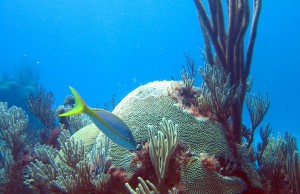Group Campaigns For Bermuda Marine Park
 Global Ocean Legacy, a international project being coordinated by the Pew Environment Group and its partners, hopes to establish a worldwide system of large, highly protected marine reserves where fishing and other extractive activities are protected — including one in Bermuda’s waters.
Global Ocean Legacy, a international project being coordinated by the Pew Environment Group and its partners, hopes to establish a worldwide system of large, highly protected marine reserves where fishing and other extractive activities are protected — including one in Bermuda’s waters.
Aside from Bermuda, Pew has called for the establishment of marine national parks off Chagos in the Indian Ocean, in Australia’s Coral Sea, off the South Pacific Kermadecs islands, at the Hawaiian Papahānaumokuākea Marine National Monument, at the Mariana Trench Marine National Monument and in the waters surrounding Pitcairn.
“Our goal is to work with the Government of Bermuda, non-government organisations and scientists to establish a very large, no-take marine reserve to protect Bermuda’s ocean habitat within its Exclusive Economic Zone [EEZ], which extends from the islands’ coastline out to 200 nautical miles, and is part of the Sargasso Sea,” said the Pew Environmental Group, which launched the marine national park scheme in 2010.
Protection on this scale would:
- Ensure that the Sargasso Sea and its important marine life is safeguarded;
- Provide an important contribution to the internationally agreed target to protect 10 percent of the world’s seas; and
- Demonstrate Bermuda’s role as a world leader in ocean conservation and its place as a world-class destination for tourism and scientific research.
The Pew Environmental Group is placing particular emphasis on Bermuda because globally important seagrass meadows, coral reefs, mangrove swamps, diverse marine life, and an extensive network of underwater caves exist here.
“The warm waters of the Gulf Stream enable Bermuda’s shallow near-shore waters to support the northernmost coral reef system in the world,” said Pew. “Approximately 4,600 of Bermuda’s more than 8,000 species are found in its blue waters.
National Geographic Report On Bermuda’s Waters
“Thirty-six of these marine species are recognised as threatened by the International Union for Conservation of Nature [IUCN] Red List of Threatened Species, including the green turtle, oceanic whitetip shark and blue whale. Sixteen species of whale, seven of dolphin and ten of sharks are known to live in Bermuda’s waters.
Bermuda and its surrounding waters lie within the Sargasso Sea, an enormous mass of water that is driven in a clockwise direction by strong ocean currents.
“Floating on its surface are large mats of unique seaweed known as Sargassum, which support a unique variety of marine life,” said Pew. “Scientists have documented that eel species from European and North American rivers migrate here to spawn. Their young then make their way back to live in these rivers.”
The Sargasso Sea also plays an important role in the life cycles of tuna, dolphin, wahoo, billfish, sea turtles, marine birds and the porbeagle shark, which is considered “vulnerable” by the IUCN Red List of Threatened Species.
Recent research has found that the Sargasso Sea serves as critical birthing grounds for the shark species.
“Given this highly productive ecosystem, scientists, Bermudians and others are concerned about protecting this area from emerging threats, such as proposals to harvest Sargassum for biofuel,” said Pew.
The Pew Environment Group works with local citizens, governments and scientists around the world to protect and conserve some of the earth’s most important and unspoiled marine environments.
In Bermuda, the Pew Environment Group has consulted with Government, researchers at the Bermuda Institute of Ocean Sciences and the Bermuda Aquarium, Museum & Zoo and is one of the sponsors of the island’s Sargasso Sea Alliance.
The Pew Charitable Trusts are an independent non-profit, non-governmental organization [NGO], founded in 1948 by American billionaire J. Howard Pew. With over $5 billion in assets, its mission is to serve the public interest by “improving public policy, informing the public, and stimulating civic life.”
Recent Florida Atlantic University Lecture On Secrets of the Sargasso Sea
Read More About
Category: All, Environment


We do very little to protect our marine enviroment here. We have some fishermen who will fish till the last thing swimming is gone. We have unregulated unenforced fishing off bridges & docks. We have certain areas used day after day by snorkeling tours which are getting to be marine deserts from people standing on coral. We have species like the lionfish, who knows how that got here, which are killing off the reef fish. Then there are natural causes such as the rise in water level & cooling of the ocean. Bermuda is the northernmost place on earth where live coral is found.
Some unpleasant regulations need to be enacted, and enforced, to help the enviroment around Bermuda so that it will be there for future generations.
Group Campaigns For Bermuda Marine Park: Oh boy! I’ll bet the pee el pee will jump on that idea!! The environment!? NOT!!
Nope , they’re only interested in building new buildings.